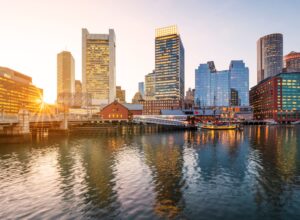 3 min read January 2023 — There’s arguably no greater pulse for the business community than its local chamber of commerce. With a deep understanding of the region’s business needs, South Shore Chamber of Commerce CEO Peter Forman and Quincy Chamber of Commerce President Tim Cahill spoke with Invest: about industry growth, long-term development plans and priorities in 2023.
3 min read January 2023 — There’s arguably no greater pulse for the business community than its local chamber of commerce. With a deep understanding of the region’s business needs, South Shore Chamber of Commerce CEO Peter Forman and Quincy Chamber of Commerce President Tim Cahill spoke with Invest: about industry growth, long-term development plans and priorities in 2023.
What are your main takeaways from the past 12-18 months?
Tim Cahill: In terms of development, the city has witnessed huge growth in industries like life sciences and technology. Traditional financial services like insurance companies have always been part of the city’s growth and these businesses have also flourished. Quincy transformed about 30 years ago when it moved from a manufacturing hub into an information technology and service-driven economy. Therefore, The shipyard that was the mainstay of the city’s growth shut down. We are now becoming more than just a bedroom community in Boston with a transition to a more self-sustaining city with different activities. Any visitor can stay over the weekend without using it as a backdoor into Boston.
 Peter Forman: The South Shore is a suburban, regional area outside of Boston, and we are still dealing with the shakeout from COVID. We are still figuring out what that means for business models, what it means for commuters and workers and how that will affect office space and commercial real estate. It can impact housing as well and we are seeing a lot of turnover of professionals and ownership in small businesses. People are changing their business models and their careers, so we are seeing more small-business startups. I have yet to see any wholesale movement of office space from the city into the suburbs. Everyone is still analyzing the business climate and their real estate needs.
Peter Forman: The South Shore is a suburban, regional area outside of Boston, and we are still dealing with the shakeout from COVID. We are still figuring out what that means for business models, what it means for commuters and workers and how that will affect office space and commercial real estate. It can impact housing as well and we are seeing a lot of turnover of professionals and ownership in small businesses. People are changing their business models and their careers, so we are seeing more small-business startups. I have yet to see any wholesale movement of office space from the city into the suburbs. Everyone is still analyzing the business climate and their real estate needs.
What are some ways you expect the business community to grow in your area?
Forman: The South Shore 2030 plan strives to identify key strategies to make us stronger economically. It is about what key agendas the business community should drive for in building a more economically competitive region. The key components for us are demographic, which got us into housing. We are a slightly older region than other metropolitan areas, so to change that we need to alter some of the housing patterns in the suburbs. The movement is from single-family detached housing to multifamily mixed-use housing and also small-lot compact development housing that is more appealing to younger professionals from the city. The infrastructure is mainly looking at transportation and water, and issues with wastewater capacity. We are looking at how business and environmental groups may develop a common agenda that would help to protect and sustain water resources and allow for new growth.
Cahill: Growth always comes with challenges but it just has to be managed. In the last five years, 6,000 new housing units have come online, with another 4,000 in the pipeline. Of course, more people mean more cars, so this has to be taken into account in order to grow smartly. Many college students who come to the greater Boston area end up staying, although not so much in the metro area, so we benefit from this. We have ocean access, hiking access, good public schools and a good business environment for people who want to leave the urban setting.
What is the Chamber’s role in the local business ecosystem and the community?
Cahill: The primary role of the Chamber is to help businesses grow, especially the small businesses that need us the most. We are a small Chamber focusing on one community with slightly more than 500 members. We’re in the middle, a little below the big guys and slightly above the smaller folks, and we have such a vibrant business community. We have focused on pop-up shops and nontraditional brick-and-mortar businesses, creating markets for farmers, creating holiday markets, and giving vendors the tools and resources they need to open up brick-and-mortar stores. We are starting to see some of that happen. Three decades ago, Quincy was known as a shopper’s town because of the vibrant business environment, and we’re trying to bring that back in the form of pop-ups and outdoor events.
What are some top priorities for 2023?
Forman: We are positive that 2023 will be a great year. Massachusetts lost some population last year but the area south of Boston had a slight gain. We expect younger people to age out of the city. It is a generational thing and that movement will accelerate their move to the suburbs. The challenge is to figure out what areas they will be attracted to. Talent and workforce development will be important in this. The commute to Boston can be tough and a lot of people made a lifestyle change during COVID. They are starting new businesses, so we expect to see more entrepreneurial startups in the area. We are seeing a lot of energy but we are still trying to figure out how business models have changed.
A common theme in 2023 will be almost a complete turnover of the government at the state level. A lot of people will be watching to see the new priorities and agendas that will impact economic development. In the past, it has been picking key clusters to build on but at other times it has been about trying to build around certain geographic strategies, such as second- and third-tier cities. We are all waiting to see where the priorities are going to be.
For more information, visit:
https://www.southshorechamber.org/
https://thequincychamber.com/
